
- Astro JS Tutorial
- Astro JS - Home
- Astro JS - Overview
- Astro JS vs Next JS
- Astro JS vs React JS
- Astro JS Setup
- Astro JS - Installation
- Astro JS - Project Structure
- Astro JS - Pages
- Astro JS Architecture
- Astro JS - Islands
- Astro JS - Islands Architecture
- Astro JS Routing
- Astro JS - Routing
- Astro JS - Dynamic Routing
- Astro JS - Redirecting Routes
- Astro JS - i18n Routing
- Astro JS Configuration
- Astro JS - Configuration
- Astro JS - Editor Setup
- Astro JS - TypeScript Configuration
- Astro JS - Environment Variables
- Astro JS Build UI
- Astro JS - Components
- Astro JS - Slots
- Astro JS - Layouts
- Astro JS - Fonts
- Astro JS - Scripts
- Astro JS Create Website
- Astro JS - Markdown Contents
- Astro JS - Add Images
- Astro JS - Manage Content
- Astro JS - Content Collections
- Astro JS - Data Fetching
- Astro JS Styling and CSS
- Astro JS - Styling
- Astro JS - CSS Integration
- Astro JS - CSS Cascading Order
- Astro JS Integrations
- Astro JS - React Integrations
- Astro JS - Svelte Integrations
- Astro JS - Solid Integrations
- Astro JS - Vue Integrations
- Astro JS Adapters
- Astro JS - Netlify Adapter
- Astro JS - Cloudflare Adapter
- Astro JS Testing and Deployment
- Astro JS - Testing
- Astro JS - Deployment
- Astro JS Advanced Topics
- Astro JS - State Management
- Astro JS - Prefetching
- Astro JS - Middleware
- Astro JS - Endpoints
- Astro JS - Authentication
- Astro JS - Bun Environment
- Astro JS - Docker
- Astro JS - View Transition
- Astro JS - Transition Directives
- Astro JS - Astro DB
- Astro JS - Bundling
- Astro JS Useful Resources
- Astro JS - Interview Questions
- Astro JS - Cheatsheet
Astro JS - Data Fetching
Data Fetching
Astro provides multiple ways to fetch data from various sources like APIs, databases, and files. You can use the built-in fetch function to fetch data from any source. The fetch function is similar to the browser's fetch API, but it is optimized for Astro's build process.
The fetch() Function
The fetch function is a global function used to fetch data from a URL. The fetch function returns a promise that resolves to the Response to that request, whether it is successful or not. All Astro components have access to the global fetch() function in their component script to make HTTP requests to APIs using the full URL.
This fetch call will be executed at build time, and the data will be available to the component template for generating dynamic HTML. If SSR mode is enabled, any fetch calls will be executed at runtime.
Example
Let's see an example of fetching data from an API using the fetch function.
---
const response = await fetch('https://jsonplaceholder.typicode.com/posts');
const posts = await response.json();
---
<html>
<body>
<h1>Blog Posts</h1>
{posts.map(post => (
<article>
<h2>{post.title}</h2>
<p>{post.body}</p>
</article>
))}
</body>
</html>
Output
The output is shown below. You can see that the blog posts are displayed in the browser.

Dynamic Data Fetching (SSR)
Sometime, the data in your API provides may change frequently. In such cases, you can use the Astro's server-side rendering (SSR) feature to fetch data dynamically at runtime. By configuring your project for SSR, you can fetch data on each request, ensuring the content is up-to-date. Let's see how to do this.
Enable SSR
First, we need to enable SSR in the Astro project. To do this, open the 'astro.config.mjs' file and set the 'output' property to 'server'.
// astro.config.mjs
import { defineConfig } from 'astro/config';
export default defineConfig({
output: 'server',
});
With SSR enabled, you can fetch data dynamically in your components:
---
const response = await fetch('https://api.example.com/data');
const data = await response.json();
---
<html>
<body>
<h1>{data.title}</h1>
<p>{data.content}</p>
</body>
</html>
Fetching Data in Framework Components
If you're using framework components (e.g., React, Svelte) within Astro, you can perform data fetching inside these components using their respective lifecycle methods. For instance, in a React component:
Example
Let's see an example of fetching data in a React component using the useEffect hook.
import { useState, useEffect } from 'react';
function DataComponent() {
const [data, setData] = useState(null);
useEffect(() => {
async function fetchData() {
const response = await fetch('https://api.example.com/data');
const result = await response.json();
setData(result);
}
fetchData();
}, []);
if (!data) return <div>Loading...</div>;
return (
<div>
<h1>{data.title}</h1>
<p>{data.content}</p>
</div>
);
}
export default DataComponent;